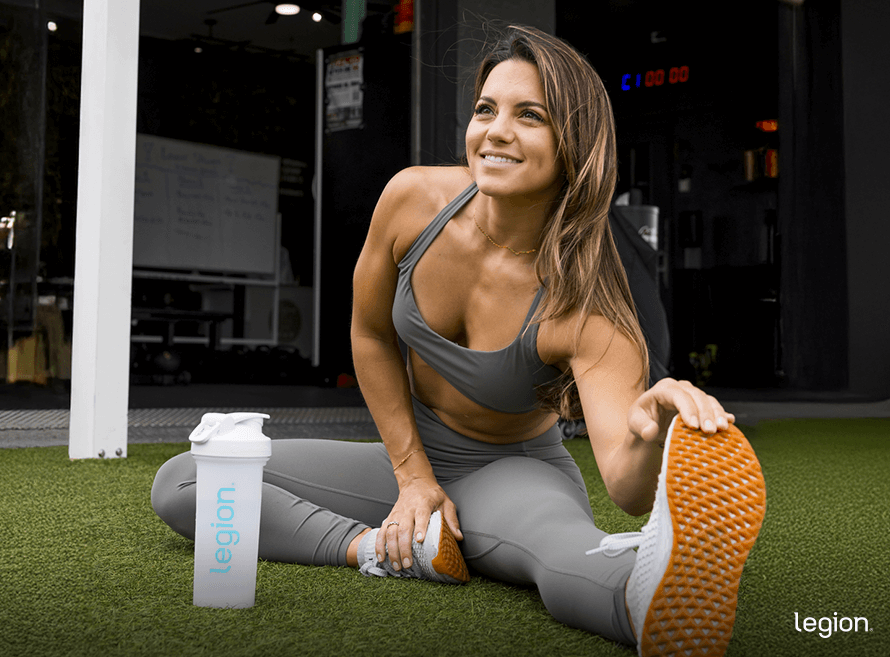
Cutting calories to lose fat is straightforward in theory—but much harder in practice.
As your calories go down, energy, motivation, and training performance often follow.
That’s why thermogenic pre-workouts have become popular.
They’re formulated to help you train hard while dieting by boosting energy, focus, and endurance, while also increasing how many calories you burn during workouts.
But do they actually work?
How do you know if you should use one?
And if you should, how do you choose the best one for you?
Get evidence-based answers to these questions and more in this article.
Key Takeaways
- A thermogenic pre-workout is a supplement that simultaneously boosts exercise performance and fat burning.
- They can help you lose fat faster when your diet and training are already on point, but they won’t cause fat loss on their own.
- The best thermogenic pre-workouts contain ingredients like caffeine, L-theanine, L-carnitine L-tartrate, capsaicinoids, grains of paradise, citrulline malate, beta-alanine, and betaine at clinically effective doses.
- They’re most useful for people who are cutting and want help maintaining training performance while calories are lower.
- For a thermogenic pre-workout containing clinically effective doses of science-backed ingredients that’s lab-tested for purity and accuracy, try Pulse+ Burn.
Table of Contents
+
What Is a Thermogenic Pre-Workout?
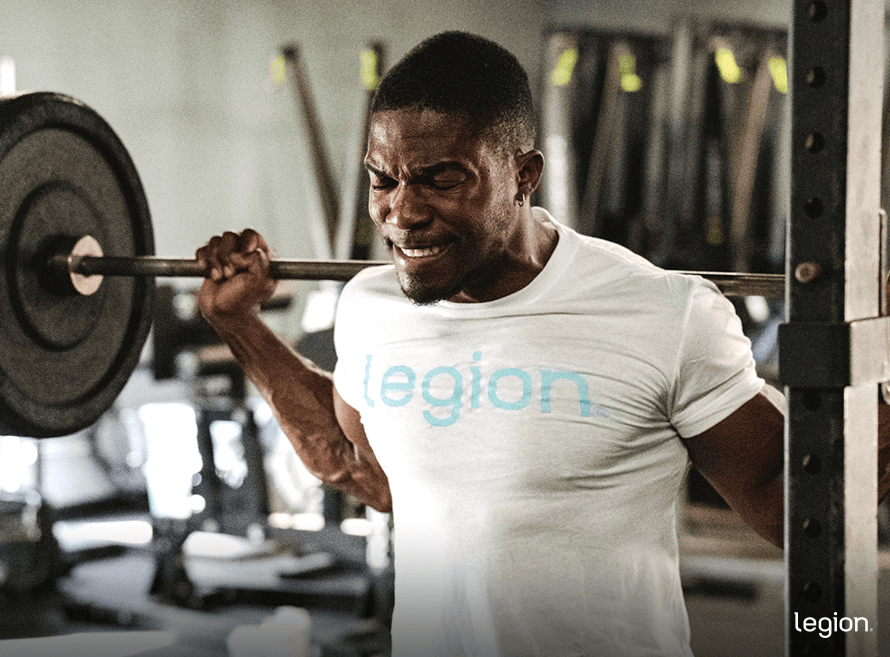
A thermogenic pre-workout is a supplement designed to boost exercise performance while also promoting fat burning.
Depending on the brand, you may also see them referred to as a fat-burning pre-workout or weight-loss pre-workout.
Regardless of the label, these supplements typically combine ingredients that help you train harder with compounds that increase thermogenesis.
Thermogenesis simply refers to heat production in the body. That heat production is tied to energy expenditure—typically, more heat means more calories burned.
In other words, a thermogenic pre-workout is a hybrid between a regular pre-workout supplement and a fat burner. That’s why thermogenic pre-workouts are often marketed as the best pre-workout for weight loss—they support calorie burning while helping you train hard.
Do Thermogenic Pre-Workouts Work? (What They Do—and Don’t Do)
Yes—thermogenic pre-workout supplements help you lose fat faster, provided you also know how to diet and exercise to drive fat loss.
To lose fat, you need to eat fewer calories than you burn. This is called a “calorie deficit” and the best way to create one is by managing your calorie intake.
Exercise also plays an important role by burning additional calories—which either enlarges your deficit or lets you eat a bit more while staying in one—and by helping you maintain muscle, which keeps your metabolism ticking and supports healthier, long-term fat loss.
Thermogenic pre-workouts can then provide a small but meaningful boost by supporting fat burning and boosting energy, focus, and performance, which allows you to train harder and longer. Over time, this can lead to greater fat loss compared to training without one.
Still, their effects are incremental, not transformational.
You won’t lose fat simply by adding a thermogenic pre-workout if your calorie intake is too high. Think of it as a helper, not the driver—it enhances your results when your diet and training are already on point, but it won’t cause fat loss on its own.
Thermogenic Pre-Workout Ingredients That Matter
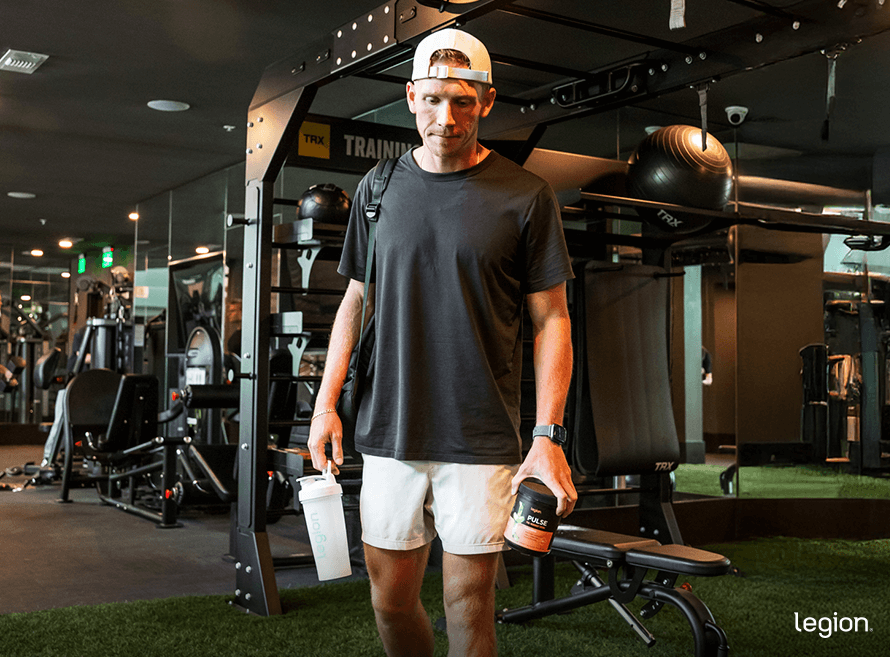
A well-formulated thermogenic pre-workout combines ingredients that boost energy and focus, increase calorie burn, and enhance endurance and performance—without relying on excessive stimulants.
To make it easy to see what matters (and what doesn’t), here’s a quick cheat sheet showing the key ingredients, what they do, and how much you have to take for them to be effective:
The Best Thermogenic Pre-Workout Ingredients
| Compound | Key Effects | Effective Dose |
|---|---|---|
| Caffeine |
|
1–6 mg/kg body weight |
| L-Theanine |
|
1:1–2:1 theanine:caffeine ratio |
| L-Carnitine L-Tartrate |
|
500–2,000 mg/day |
| Capsaicinoids |
|
2–10 mg actives/day |
| Grains of Paradise |
|
~30 mg extract/day (2–4 mg 6-paradol) |
| Citrulline Malate |
|
6–8 g before training |
| Beta-Alanine |
|
2.6–6.4 g/day (≈3.6 g common) |
| Betaine |
|
2–4 g/day (≈2.5 g common) |

Below, you’ll find more detail on each ingredient—what the research shows and how it supports fat loss and training performance.
Caffeine
Caffeine is a natural stimulant found in coffee, tea, and cocoa. It blocks adenosine—a compound that causes tiredness—and stimulates your nervous system to increase alertness, metabolic rate, energy, and athletic performance.
L-Theanine
L-theanine is an amino acid that reduces stress and promotes relaxation and focus by interacting with neurotransmitters that lower excitatory brain signals and boost calming ones.
When paired with caffeine, it enhances mood, memory, and attention while reducing side effects like jitters and anxiety—helping you feel calm yet focused.
L-Carnitine L-Tartrate
L-carnitine L-tartrate helps the body convert fat into energy by shuttling fatty acids into your cells’ mitochondria, where they’re burned for fuel. It also enhances the function of the enzyme that controls this process, which may help you burn more fat during exercise and train harder for longer.
Research shows L-carnitine L-tartrate supports fat burning, reduces exercise–induced muscle damage, and may improve strength endurance and power.
Capsaicinoids
Capsaicinoids—the compounds that make chili peppers spicy—support fat burning by decreasing the activity of genes that promote fat storage, while activating ones that boost energy expenditure.
They also activate a protein that responds to heat and supports fat burning and appetite control.
On top of that, research suggests they may help you train harder by increasing strength and strength endurance and reducing perceived effort during exercise.
Grains of Paradise
Grains of paradise is an herb in the ginger family. It contains compounds like 6-gingerol and 6-paradol that influence receptors on fat cells involved in energy regulation and temperature perception.
That’s why research shows that supplementation with grains of paradise increases energy expenditure and supports visceral fat burning.
Citrulline Malate
Citrulline malate increases the production of nitric oxide—a gas that widens blood vessels and improves circulation.
As a result, it improves muscle endurance, strength, and power, relieves muscle soreness, and reduces perceived effort during exercise.
Beta-alanine
Beta-alanine is an amino acid that plays a role in reducing muscle acidity, which increases the amount of work that muscles can do before they become fatigued.
Studies show it improves muscle endurance, particularly during bouts of exercise lasting 1–4 minutes (like circuits or supersets), boosts anaerobic exercise capacity, and reduces feelings of fatigue during exercise.
Betaine
Betaine (or trimethylglycine) is a compound derived from the amino acid glycine that supports several cellular functions, including building DNA, breaking down fat, and balancing fluid inside and outside cells.
These effects help you stay properly hydrated and produce energy efficiently, which is why research shows betaine can increase muscle endurance, strength, and power.
How & When to Take a Thermogenic Pre-Workout
Most thermogenic pre-workout supplements come as a powder that you mix with water and drink 30 to 60 minutes before you train to ensure the ingredients kick in when you start your workout.
As a general rule, avoid taking high-caffeine pre-workouts within 6 to 8 hours of bedtime. Caffeine’s stimulating effects last longer than most people realize, which can disrupt your sleep—and poor sleep, in turn, can slow fat loss, increase muscle loss, and hamper performance.
If you can’t always train early in the day, alternating between formulas works well: take thermogenic pre-workout before early workouts and stim-free pre-workout before later ones. That way, you’ll still get the energy and focus benefits without compromising sleep or recovery.
Safety, Side Effects & Who Should Avoid Thermogenic Pre-Workout
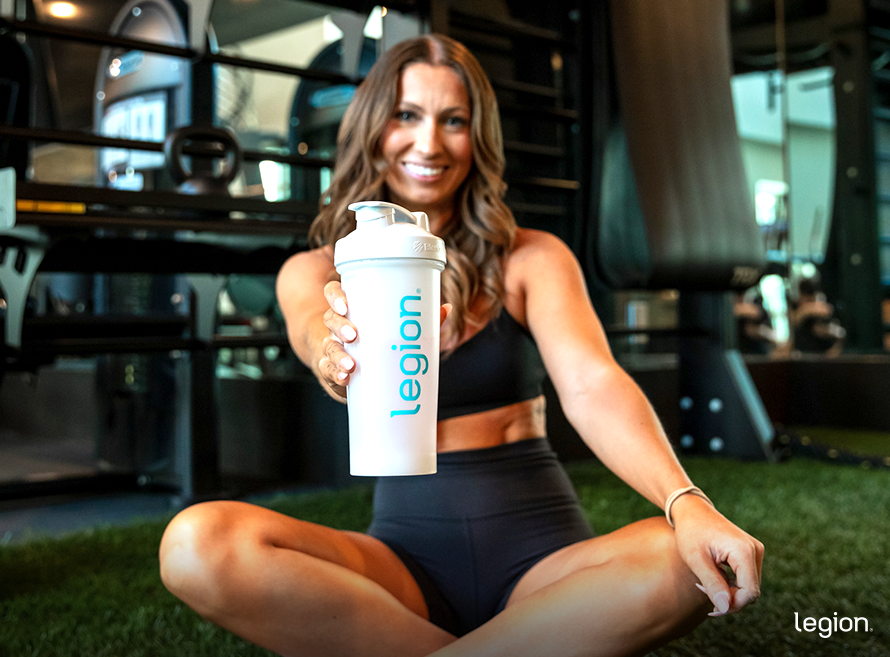
Most of the ingredients used in thermogenic pre-workouts are well-researched and safe for healthy adults when taken at recommended doses.
Still, some can cause mild, temporary side effects in certain people. For example, caffeine may cause jitters, anxiety, or an upset stomach—especially if you’re sensitive to stimulants or take it on an empty stomach.
Beta-alanine can cause a harmless tingling or itching sensation in the skin (called paresthesia), though this usually goes away within 30 to 60 minutes and isn’t cause for concern.
If you have a medical condition or are taking medication, it’s wise to check with your doctor before using a thermogenic pre-workout, since some ingredients can interact with prescription drugs.
However, the biggest safety concern isn’t the ingredients—it’s quality control.
Some shady supplement companies mislabel products or spike them with potentially harmful ingredients. And that’s why third-party testing matters.
To ensure you know exactly what you’re taking—and that it’s both safe and effective—look for a thermogenic pre-workout that:
- Is tested by an independent lab for purity and accuracy
- Makes those test results publicly available
If a product doesn’t meet these criteria, it’s usually best to avoid it.
Who Should (and Shouldn’t) Use Thermogenic Pre-Workout
The people who benefit most are those already training regularly and eating in a way that supports fat loss.
The performance ingredients help you maintain your training quality when in a calorie deficit, which is important because hard training is what helps you burn extra calories and maintain muscle while dieting. Meanwhile, the thermogenic ingredients can provide a small but meaningful boost to calorie burn.
Whether it’s worth using depends on your situation. Use the flowchart below to see if a thermogenic pre-workout makes sense for you:
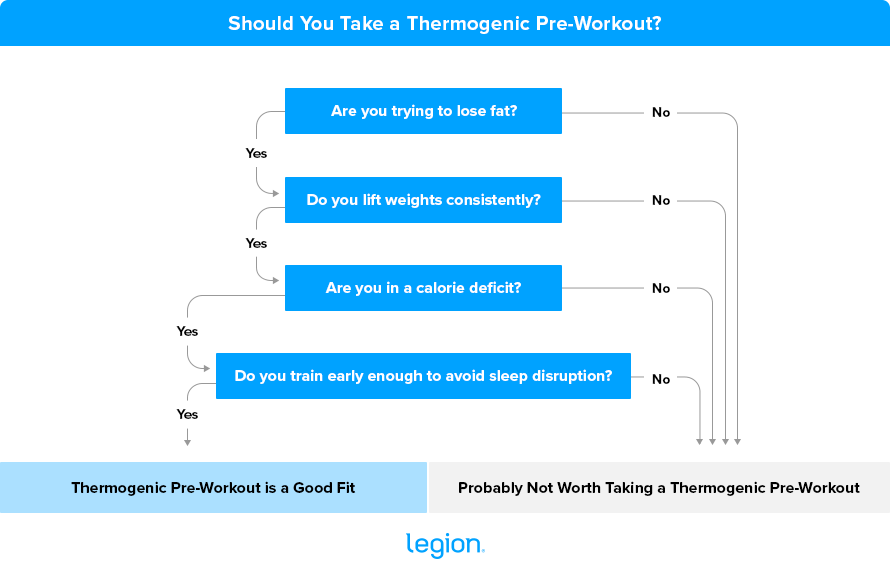
How to Choose the Best Thermogenic Pre-Workout for You
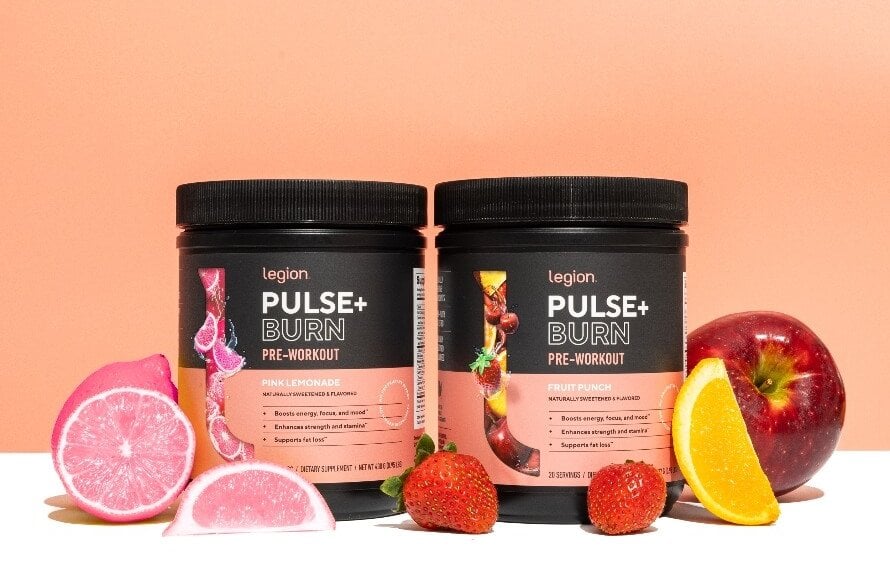
If you’re looking for the best thermogenic pre workout, here are three things to look out for:
- Research-backed ingredients
- Clinically effective doses
- Third-party testing for purity and label accuracy
And if you want a thermogenic pre-workout that checks all these boxes, try Pulse+ Burn.
Pulse+ Burn contains caffeine, L-theanine, L-carnitine L-tartrate, Capsimax™ capsaicinoid extract, grains of paradise, citrulline malate, beta-alanine, and betaine at doses shown by peer-reviewed scientific research to have clear benefits in healthy humans.
It’s also naturally sweetened and flavored, with no added sugars, artificial sweeteners, flavors, dyes, fillers, or other unnecessary junk.
And unlike many supplements on the market, every batch of Pulse+ Burn is third-party tested to verify purity and accuracy and independently certified to meet or exceed FDA safety guidelines.
If you’re not sure whether Pulse+ Burn is the right fit for your goals and budget, take the Legion Supplement Finder Quiz to get personalized recommendations. Click here to check it out.
The Bottom Line on Thermogenic Pre Workout
Thermogenic pre-workouts won’t magically make you lose fat, but if you’re already training consistently and eating in a calorie deficit, they can help you lose fat faster.
The performance ingredients help you keep training hard when calories are lower, and the thermogenic ingredients can slightly increase calorie burn during and after your workouts. Over time, those incremental benefits add up.
Just make sure you choose a product that uses research-backed ingredients, clinically effective doses, and transparent third-party testing—so you know it’s both safe and effective.
Use the flowchart above to see if a thermogenic pre-workout makes sense for you—and if it does, Pulse+ Burn is a well-formulated option that checks every box.
FAQ #1: What are the downsides of thermogenics?
The main downsides come from stimulants, especially caffeine. Some people may experience jitters, anxiety, headaches, an increased heart rate, or trouble sleeping—particularly if they take a high dose, are sensitive to caffeine, or use it too close to bedtime.
Some ingredients can also cause mild digestive upset, and beta-alanine often causes a harmless tingling sensation in the skin. These effects are temporary and typically fade as your body adjusts.
If you have a medical condition, take medication, or are unsure how your body will respond, it’s best to check with your doctor before using a thermogenic pre-workout.
FAQ #2: Can I take a thermogenic with a pre-workout?
Yes, you can add thermogenic ingredients to your regular pre-workout and see similar benefits—as long as you’re confident about the doses, purity, and how those ingredients interact with what you’re already taking.
The challenge is that this usually requires:
- Sourcing each ingredient individually
- Measuring and adjusting the doses accurately
- Confirming there are no overlaps or interactions with your current pre-workout
Most people either get the dosing wrong or end up with under-dosed or low-quality raw ingredients, which reduces effectiveness.
That’s why many prefer a thermogenic pre-workout that’s already formulated as a single product—the ingredients and doses are designed to work together safely and effectively, without having to do your own label math.
FAQ #3: What’s the difference between a fat burner and a thermogenic pre-workout?
A fat burner is usually taken once or twice per day to increase calorie expenditure and support appetite control throughout the day. It can help you burn a little more fat, but it doesn’t improve workout performance.
A thermogenic pre-workout, on the other hand, is designed to be taken before training. It includes thermogenic ingredients plus performance-enhancing ingredients that help you train harder for longer and burn more calories during your workout.
Want More Content Like This?
Check out these articles:
- Pre-Workout vs. Energy Drink: Which Is Best for You?
- Can You Mix Creatine with Pre-Workout for Greater Gains?
- Does Pre-Workout Cause Acne? What Science Says
Scientific References +
- Astrup, A, et al. “Caffeine: A Double-Blind, Placebo-Controlled Study of Its Thermogenic, Metabolic, and Cardiovascular Effects in Healthy Volunteers.” The American Journal of Clinical Nutrition, vol. 51, no. 5, 1 May 1990, pp. 759–767, https://doi.org/10.1093/ajcn/51.5.759.
- Conger, Scott A., et al. “Does Caffeine Increase Fat Metabolism? A Systematic Review and Meta-Analysis.” International Journal of Sport Nutrition and Exercise Metabolism, vol. 33, no. 2, 2022, pp. 1–9, https://doi.org/10.1123/ijsnem.2022-0131.
- Spriet, Lawrence L. “Exercise and Sport Performance with Low Doses of Caffeine.” Sports Medicine, vol. 44, no. S2, 30 Oct. 2014, pp. 175–184, www.ncbi.nlm.nih.gov/pmc/articles/PMC4213371/, https://doi.org/10.1007/s40279-014-0257-8.
- McLellan, Tom M., et al. “A Review of Caffeine’s Effects on Cognitive, Physical and Occupational Performance.” Neuroscience & Biobehavioral Reviews, vol. 71, Dec. 2016, pp. 294–312, www.sciencedirect.com/science/article/pii/S0149763416300690?via%3Dihub, https://doi.org/10.1016/j.neubiorev.2016.09.001.
- Warren, Gordon L, et al. “Effect of Caffeine Ingestion on Muscular Strength and Endurance: A Meta-Analysis.” Medicine and Science in Sports and Exercise, vol. 42, no. 7, 2010, pp. 1375–87, https://doi.org/10.1249/MSS.0b013e3181cabbd8.
- Fernández-Sánchez, Javier, et al. “Effect of Acute Caffeine Intake on Fat Oxidation Rate during Fed-State Exercise: A Systematic Review and Meta-Analysis.” Nutrients, vol. 16, no. 2, 1 Jan. 2024, p. 207, www.mdpi.com/2072-6643/16/2/207, https://doi.org/10.3390/nu16020207.
- Kimura, Kenta, et al. “L-Theanine Reduces Psychological and Physiological Stress Responses.” Biological Psychology, vol. 74, no. 1, Jan. 2007, pp. 39–45, https://doi.org/10.1016/j.biopsycho.2006.06.006.
- Bryan, Janet. “Psychological Effects of Dietary Components of Tea: Caffeine and L-Theanine.” Nutrition Reviews, vol. 66, no. 2, 4 Feb. 2008, pp. 82–90, https://doi.org/10.1111/j.1753-4887.2007.00011.x. Accessed 9 Feb. 2020.
- Einöther, Suzanne J.L., et al. “L-Theanine and Caffeine Improve Task Switching but Not Intersensory Attention or Subjective Alertness.” Appetite, vol. 54, no. 2, Apr. 2010, pp. 406–409, https://doi.org/10.1016/j.appet.2010.01.003.
- Gomez-Ramirez, Manuel, et al. “The Effects of L-Theanine on Alpha-Band Oscillatory Brain Activity during a Visuo-Spatial Attention Task.” Brain Topography, vol. 22, no. 1, 1 June 2009, pp. 44–51, www.ncbi.nlm.nih.gov/pubmed/18841456, https://doi.org/10.1007/s10548-008-0068-z. Accessed 1 Mar. 2020.
- Askarpour, Moein, et al. “Beneficial Effects of L-Carnitine Supplementation for Weight Management in Overweight and Obese Adults: An Updated Systematic Review and Dose-Response Meta-Analysis of Randomized Controlled Trials.” Pharmacological Research, vol. 151, Jan. 2020, p. 104554, https://doi.org/10.1016/j.phrs.2019.104554.
- Pooyandjoo, M., et al. “The Effect of (L-)Carnitine on Weight Loss in Adults: A Systematic Review and Meta-Analysis of Randomized Controlled Trials.” Obesity Reviews, vol. 17, no. 10, 22 June 2016, pp. 970–976, https://doi.org/10.1111/obr.12436.
- SPIERING, BARRY A., et al. “RESPONSES of CRITERION VARIABLES to DIFFERENT SUPPLEMENTAL DOSES of L-CARNITINE L-TARTRATE.” Journal of Strength and Conditioning Research, vol. 21, no. 1, Feb. 2007, pp. 259–264, https://doi.org/10.1519/00124278-200702000-00046. Accessed 26 Mar. 2021.
- Ho, Jen-Yu, et al. “L-Carnitine L-Tartrate Supplementation Favorably Affects Biochemical Markers of Recovery from Physical Exertion in Middle-Aged Men and Women.” Metabolism, vol. 59, no. 8, Aug. 2010, pp. 1190–1199, https://doi.org/10.1016/j.metabol.2009.11.012. Accessed 11 Mar. 2021.
- Volek, Jeff S., et al. “L-Carnitinel-Tartrate Supplementation Favorably Affects Markers of Recovery from Exercise Stress.” American Journal of Physiology-Endocrinology and Metabolism, vol. 282, no. 2, 1 Feb. 2002, pp. E474–E482, https://doi.org/10.1152/ajpendo.00277.2001. Accessed 11 Dec. 2020.
- Koozehchian, Majid S., et al. “Effects of Nine Weeks L-Carnitine Supplementation on Exercise Performance, Anaerobic Power, and Exercise-Induced Oxidative Stress in Resistance-Trained Males.” Journal of Exercise Nutrition & Biochemistry, vol. 22, no. 4, 31 Dec. 2018, pp. 7–19, https://doi.org/10.20463/jenb.2018.0026. Accessed 3 July 2020.
- Bloomer, Richard J, et al. “Effect of Oral Intake of Capsaicinoid Beadlets on Catecholamine Secretion and Blood Markers of Lipolysis in Healthy Adults: A Randomized, Placebo Controlled, Double-Blind, Cross-over Study.” Lipids in Health and Disease, vol. 9, no. 1, 2010, p. 72, www.ncbi.nlm.nih.gov/pmc/articles/PMC2912905/, https://doi.org/10.1186/1476-511x-9-72. Accessed 16 Apr. 2019.
- Urbina, Stacie L., et al. “Effects of Twelve Weeks of Capsaicinoid Supplementation on Body Composition, Appetite and Self-Reported Caloric Intake in Overweight Individuals.” Appetite, vol. 113, 1 June 2017, pp. 264–273, pubmed.ncbi.nlm.nih.gov/28235621/, https://doi.org/10.1016/j.appet.2017.02.025. Accessed 1 Oct. 2022.
- Grgic, Jozo, et al. “Effects of Capsaicin and Capsiate on Endurance Performance: A Meta-Analysis.” Nutrients, vol. 14, no. 21, 28 Oct. 2022, p. 4531, https://doi.org/10.3390/nu14214531. Accessed 12 Dec. 2022.
- de Freitas, Marcelo Conrado, et al. “Acute Capsaicin Supplementation Improved Resistance Exercise Performance Performed after a High-Intensity Intermittent Running in Resistance-Trained Men.” Journal of Strength and Conditioning Research, vol. Publish Ahead of Print, 28 Nov. 2019, https://doi.org/10.1519/jsc.0000000000003431. Accessed 27 Nov. 2020.
- SUGITA, Jun, et al. “Daily Ingestion of Grains of Paradise (Aframomum Melegueta) Extract Increases Whole-Body Energy Expenditure and Decreases Visceral Fat in Humans.” Journal of Nutritional Science and Vitaminology, vol. 60, no. 1, 2014, pp. 22–27, www.jstage.jst.go.jp/article/jnsv/60/1/60_22/_pdf, https://doi.org/10.3177/jnsv.60.22.
- Sugita, Jun, et al. “Grains of Paradise (Aframomum Melegueta) Extract Activates Brown Adipose Tissue and Increases Whole-Body Energy Expenditure in Men.” British Journal of Nutrition, vol. 110, no. 4, 11 Jan. 2013, pp. 733–738, https://doi.org/10.1017/s0007114512005715. Accessed 26 Nov. 2019.
- Yoneshiro, Takeshi, et al. “Prolonged Treatment with Grains of Paradise (Aframomum Melegueta) Extract Recruits Adaptive Thermogenesis and Reduces Body Fat in Humans with Low Brown Fat Activity.” Journal of Nutritional Science and Vitaminology, vol. 67, no. 2, 2021, pp. 99–104, pubmed.ncbi.nlm.nih.gov/33952741/, https://doi.org/10.3177/jnsv.67.99. Accessed 18 June 2021.
- Sudeep, Heggar Venkataramana, et al. “Aframomum Melegueta Seed Extract with Standardized Content of 6-Paradol Reduces Visceral Fat and Enhances Energy Expenditure in Overweight Adults – a Randomized Double-Blind, Placebo-Controlled Clinical Study.” Drug Design, Development and Therapy, vol. Volume 16, Oct. 2022, pp. 3777–3791, www.ncbi.nlm.nih.gov/pmc/articles/pmid/36329722/, https://doi.org/10.2147/dddt.s367350. Accessed 26 Dec. 2022.
- Förstermann, Ulrich, and William C Sessa. “Nitric Oxide Synthases: Regulation and Function.” European Heart Journal, vol. 33, no. 7, 2012, pp. 829–37, 837a837d, https://doi.org/10.1093/eurheartj/ehr304.
- Pérez-Guisado, Joaquín, and Philip M Jakeman. “Citrulline Malate Enhances Athletic Anaerobic Performance and Relieves Muscle Soreness.” Journal of Strength and Conditioning Research, vol. 24, no. 5, 2010, pp. 1215–22, www.ncbi.nlm.nih.gov/pubmed/20386132, https://doi.org/10.1519/JSC.0b013e3181cb28e0.
- Glenn, Jordan M., et al. “Acute Citrulline Malate Supplementation Improves Upper- and Lower-Body Submaximal Weightlifting Exercise Performance in Resistance-Trained Females.” European Journal of Nutrition, vol. 56, no. 2, 11 Dec. 2015, pp. 775–784, https://doi.org/10.1007/s00394-015-1124-6.
- Glenn, Jordan M., et al. “Acute Citrulline-Malate Supplementation Improves Maximal Strength and Anaerobic Power in Female, Masters Athletes Tennis Players.” European Journal of Sport Science, vol. 16, no. 8, 28 Mar. 2016, pp. 1095–1103, https://doi.org/10.1080/17461391.2016.1158321.
- Vårvik, Fredrik Tonstad, et al. “Acute Effect of Citrulline Malate on Repetition Performance during Strength Training: A Systematic Review and Meta-Analysis.” International Journal of Sport Nutrition and Exercise Metabolism, vol. 31, no. 4, 2021, pp. 1–9, https://doi.org/10.1123/ijsnem.2020-0295.
- Trexler, Eric T., et al. “Acute Effects of Citrulline Supplementation on High-Intensity Strength and Power Performance: A Systematic Review and Meta-Analysis.” Sports Medicine, vol. 49, no. 5, 20 Mar. 2019, pp. 707–718, www.fisiologiadelejercicio.com/wp-content/uploads/2019/04/Acute-Efects-of-Citrulline-Supplementation-on-High‑Intensity-Strength.pdf, https://doi.org/10.1007/s40279-019-01091-z.
- Rhim, Hye Chang, et al. “Effect of Citrulline on Post-Exercise Rating of Perceived Exertion, Muscle Soreness, and Blood Lactate Levels: A Systematic Review and Meta-Analysis.” Journal of Sport and Health Science, vol. 9, no. 6, Feb. 2020, https://doi.org/10.1016/j.jshs.2020.02.003.
- DUNNETT, M., and R. C. HARRIS. “Influence of Oral ß-Alanine and L-Histidine Supplementation on the Carnosine Content of Thegluteus Medius.” Equine Veterinary Journal, vol. 31, no. S30, July 1999, pp. 499–504, https://doi.org/10.1111/j.2042-3306.1999.tb05273.x. Accessed 14 Dec. 2019.
- Budzeń, Sandra, and Joanna Rymaszewska. “The Biological Role of Carnosine and Its Possible Applications in Medicine.” Advances in Clinical and Experimental Medicine: Official Organ Wroclaw Medical University, vol. 22, no. 5, 2013, pp. 739–744, pubmed.ncbi.nlm.nih.gov/24285460/. Accessed 11 Jan. 2024.
- Derave, Wim, et al. “β-Alanine Supplementation Augments Muscle Carnosine Content and Attenuates Fatigue during Repeated Isokinetic Contraction Bouts in Trained Sprinters.” Journal of Applied Physiology, vol. 103, no. 5, Nov. 2007, pp. 1736–1743, https://doi.org/10.1152/japplphysiol.00397.2007.
- Stout, J. R., et al. “Effects of β-Alanine Supplementation on the Onset of Neuromuscular Fatigue and Ventilatory Threshold in Women.” Amino Acids, vol. 32, no. 3, 30 Nov. 2006, pp. 381–386, https://doi.org/10.1007/s00726-006-0474-z.
- Trexler, Eric T., et al. “International Society of Sports Nutrition Position Stand: Beta-Alanine.” Journal of the International Society of Sports Nutrition, vol. 12, no. 1, 15 July 2015, https://doi.org/10.1186/s12970-015-0090-y.
- Hill, C. A., et al. “Influence of β-Alanine Supplementation on Skeletal Muscle Carnosine Concentrations and High Intensity Cycling Capacity.” Amino Acids, vol. 32, no. 2, 28 July 2006, pp. 225–233, pubmed.ncbi.nlm.nih.gov/16868650/, https://doi.org/10.1007/s00726-006-0364-4.
- Sale, Craig, et al. “Effect of β-Alanine plus Sodium Bicarbonate on High-Intensity Cycling Capacity.” Medicine & Science in Sports & Exercise, Mar. 2011, p. 1, https://doi.org/10.1249/mss.0b013e3182188501.
- Hoffman, Jay R., et al. “Short-Duration β-Alanine Supplementation Increases Training Volume and Reduces Subjective Feelings of Fatigue in College Football Players.” Nutrition Research, vol. 28, no. 1, Jan. 2008, pp. 31–35, https://doi.org/10.1016/j.nutres.2007.11.004. Accessed 19 June 2020.
- Trepanowski, John F, et al. “The Effects of Chronic Betaine Supplementation on Exercise Performance, Skeletal Muscle Oxygen Saturation and Associated Biochemical Parameters in Resistance Trained Men.” Journal of Strength and Conditioning Research, vol. 25, no. 12, Dec. 2011, pp. 3461–3471, https://doi.org/10.1519/jsc.0b013e318217d48d.
- Zawieja, Emilia, et al. “Effects of Chronic Betaine Supplementation on Exercise Performance: Systematic Review and Meta-Analysis.” Journal of Sports Sciences, vol. 42, no. 22, Nov. 2024, pp. 2131–2144, pubmed.ncbi.nlm.nih.gov/39514262/, https://doi.org/10.1080/02640414.2024.2423578.
- Nedeltcheva, Arlet V., et al. “Insufficient Sleep Undermines Dietary Efforts to Reduce Adiposity.” Annals of Internal Medicine, vol. 153, no. 7, 5 Oct. 2010, p. 435, annals.org/aim/article-abstract/746184/insufficient-sleep-undermines-dietary-efforts-reduce-adiposity, https://doi.org/10.7326/0003-4819-153-7-201010050-00006.
- Souissi, Nizar, et al. “Effect of Time of Day and Partial Sleep Deprivation on Short‐Term, High‐Power Output.” Chronobiology International, vol. 25, no. 6, Jan. 2008, pp. 1062–1076, https://doi.org/10.1080/07420520802551568. Accessed 22 Apr. 2020.
- Souissi, Nizar, et al. “Effects of Time-of-Day and Partial Sleep Deprivation on Short-Term Maximal Performances of Judo Competitors.” Journal of Strength and Conditioning Research, vol. 27, no. 9, Sept. 2013, pp. 2473–2480, https://doi.org/10.1519/jsc.0b013e31827f4792.










